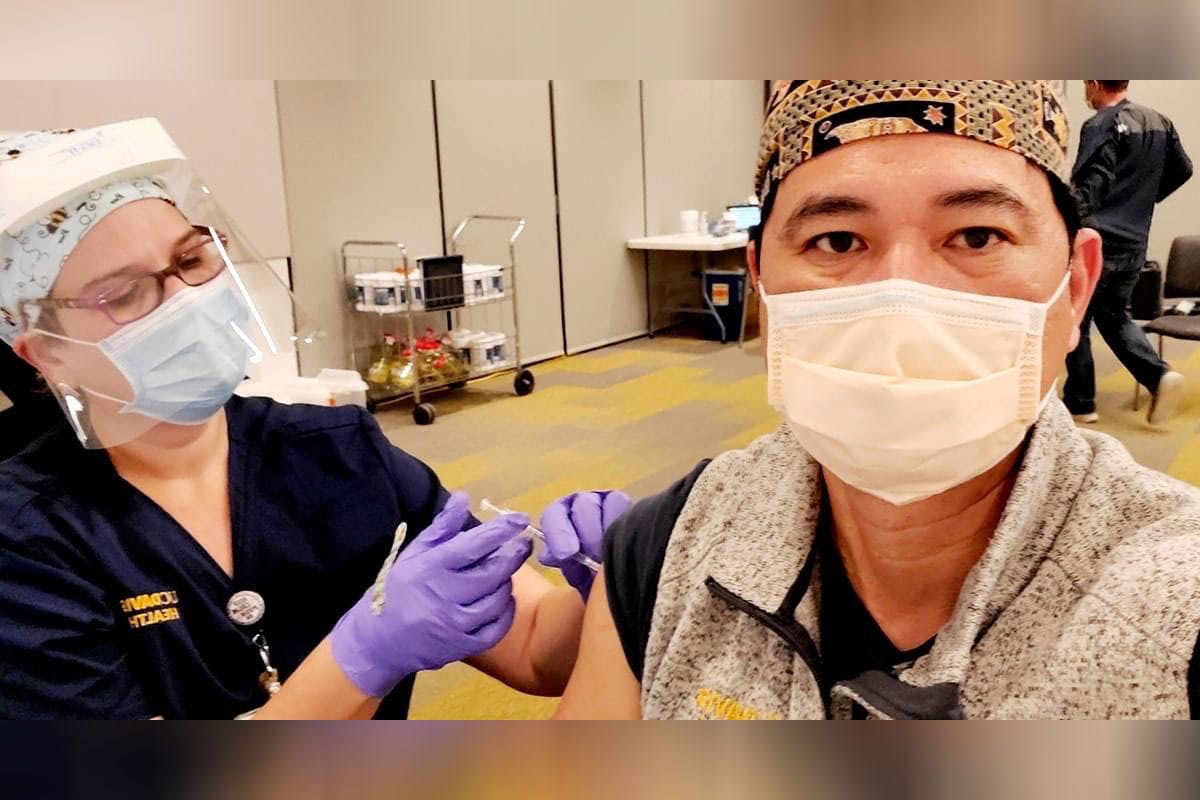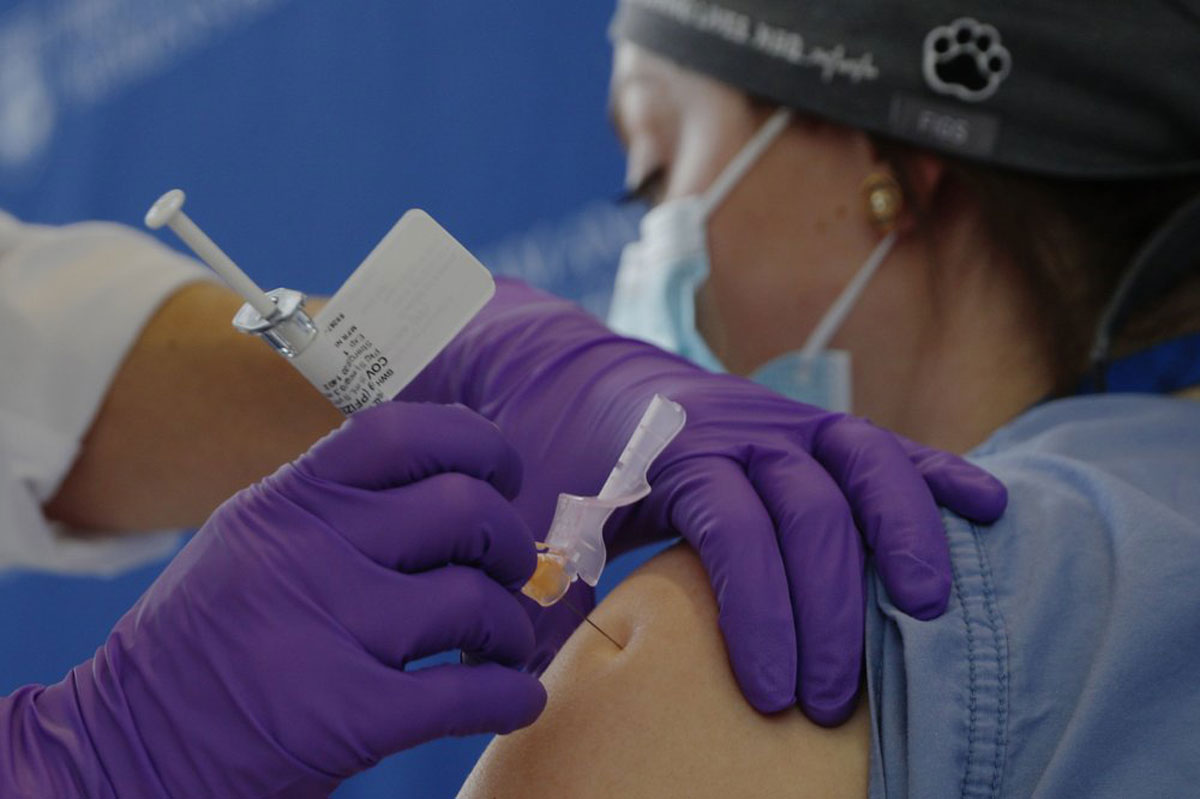Fil-Am nurse: ‘I am lucky’ to be among first to get COVID-19 vaccine in the US
Filipino-American nurse Al Madla is hoping that Filipinos will also receive the COVID-19 vaccines early. The World Health Organization said countries in the Asia-Pacific region are not guaranteed to have early access to the shots.
For Filipino-American nurse Alex Madla, the first shot of COVID-19 vaccine he received on Wednesday, Dec. 16, was not just a boost in the fight against the dreaded disease, but also to his confidence as a medical worker in the United States.
Madla, who hails from Nabuslot, Oriental Mindoro, was among the first to get the vaccine developed by Pfizer Inc. and BioNTech SE since he is assigned to the intensive care unit of the UC Davis Medical Center in Sacramento, California, where he is directly exposed to coronavirus disease 2019 or COVID-19 patients.
“I am lucky to be among the first to get the vaccine. The vaccination just started (Wednesday),” Madla told The Philippine STAR.

Madla saw a glimmer of hope for humanity after he got the first shot of the vaccine. He said it is important for healthcare workers like him and the rest of the population to be protected against the virus. As a nurse, Madla has witnessed many patients recover from the virus, but others—like the elderly—were not fortunate enough.
The number of COVID-19 cases in the US has reached 17 million, with around 308,000 reported deaths. An average of 2,500 to 3,000 people die in the US daily, Madla said.
There are some who survive, and there are some who don’t. There were younger individuals who succumbed to the disease. Mostly, the elderly are unable to recover. This COVID-19 is no joke.
Madla, who gets his second dose of the vaccine on Jan. 5 next year, said he is now more confident that he can do better in taking care of COVID-19 patients, particularly the seriously ill that they encounter at the ICU department.
“Right now, I am 55 percent protected, then after the second shot, I will be 95 percent protected,” he disclosed during the interview.
No joke
But one can never be complacent, Madla, who has been working as a nurse in the US for the past 15 years, stressed.
“There is a surge (in cases) here which is why there is another lockdown in California,” he said, adding the delivery of the vaccines was timely.
The US Food and Drug Administration announced on Friday, Dec. 11, that it has given emergency approval to Pfizer-BioNTech vaccines, which were delivered on Monday, Dec. 14.
Madla, who migrated to the US with his wife Mylene and their two children, said “we need to avoid social gatherings, wear masks and shields and protection gears to remain protected from the virus.”
This year has been most challenging in Madla’s career since he has been assigned to the UC Davis Medical Center. “There are some who survive, and there are some who don’t. There were younger individuals who succumbed to the disease. Mostly, the elderly are unable to recover,” he said.
“This COVID-19 is no joke,” he pointed out.
A week ago, Madla said there were about 34 patients confined in their hospital due to COVID-19. Now, the number has almost quadrupled to more than a hundred cases, attributing the surge to Thanksgiving gatherings or partying with relatives.
He noted it is good that the US government prioritized the vaccination of the medical professionals and healthcare health workers, to be followed by the elderly. The military has been mobilized to ensure that the vaccines will be properly distributed, Madla said.
Working on 12-hour shifts, Madla confessed he has been trying to cope with the stressful situation caused by his job. Aside from resting on his days off, Madla said he finds time trading or visiting national parks to get some fresh air and feel rejuvenated.
He believes the COVID-19 pandemic has taken toll on people’s emotional and mental health, which is why he also looks for ways to de-stress whenever there is an opportunity.
Vaccines for all

Madla said he can only hope that the vaccines will also be available to his fellow Filipinos back in Manila, especially since his 70-year-old mother and siblings as well as other relatives remain in the Philippines.
“Hopefully, it will be there soon,” Madla said, so that the world “can go back” to normal.
On Thursday, Dec. 17, the World Health Organization (WHO) said countries in the Asia-Pacific region are not guaranteed to have early access to COVID-19 shots and urged them to adopt a long-term approach to the pandemic.
“The development of safe and effective vaccines is one thing. Producing them in adequate quantities and reaching everyone who needs them is another,” WHO regional director Dr. Takeshi Kasai told reporters in the Indonesian capital, Jakarta.
While some countries that have independent vaccine purchase agreements might start vaccination campaigns in the coming months, others could see vaccination begin in the middle or late 2021, said Dr. Socorro Escalante, WHO’s coordinator for essential medicines and health technologies.
“It’s important to emphasize that most, if not all, the countries in the Western Pacific region are a part of the COVAX Facility,” Escalante said. “Within the COVAX Facility we are expecting that the vaccines will be coming in on the second quarter of 2021.”
COVAX was set up by WHO, vaccines alliance GAVI and Coalition for Epidemic Preparedness Innovations or CEPI in an effort to ensure equitable access to vaccines across the world.
WHO representatives also urged that high-risk groups should be prioritized for vaccination as vaccines will only be available in limited quantities.
The health agency warned that mass vaccination will not stop the virus and that governments need to adopt a long-term mindset and approach when new cases are detected, including increased testing, contact tracing and quarantine measures.
“The virus does not rest, and so therefore we need to continue with our responses ensuring that they are implemented consistently,” said WHO regional emergency director Dr. Babatunde Olowokure.
Olowokure also appealed to younger people – which represent growing number of new confirmed cases in the region – to adhere to social distancing and other measures.
The WHO Western Pacific Region is home to almost 1.9 billion people across 37 countries and territories.
Globally, the virus has infected more than 74 million people and killed more than 1.6 million. More than 41.9 million people have recovered from the disease. – With AP
This story originally appeared on Onenews.ph.


